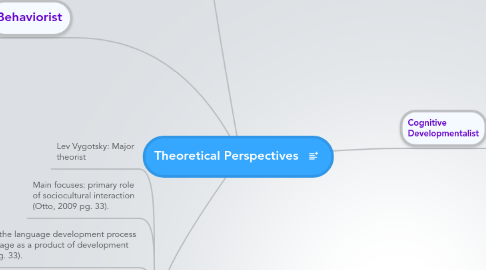
1. Behaviorist
1.1. Fredrick Skinner : Major theorist
1.2. Emphasizes the role of “nurture” (Otto, 2009 pg. 31).
1.3. Learning occurs because of the stimuli, responses, and reinforcements that occur in the environment around the child (Otto, 2009 pg. 31).
1.3.1. Learning occurs in situations where children are encouraged to imitate others' speech and to develop associations between verbal stimuli and objects (Harris, 1992 cited in Otto, 2009 pg. 31).
1.4. Children are “blank slate[s]” (Otto, 2009 pg. 31).
2. Nativist
2.1. Noam Chomsky: Major theorists of nativist perspective
2.2. Main focus: acquisition of syntactic knowledge.
2.3. Identifies grammatical aspects of language and describes the rule systems for using language.
2.3.1. Rule system: Universal grammar, is considered to be “the system of principles, conditions, and rules that are elements or properties of all human languages” (1975 cited in Otto, 2009, pg. 29)
2.4. Development and use of language is universal in every culture and because it is universal, language is a human biological instinct rather than from the existence of the culture (Otto, 2009 pg. 28-29)
3. Interactionist.
3.1. Lev Vygotsky: Major theorist
3.2. Main focuses: primary role of sociocultural interaction (Otto, 2009 pg. 33).
3.3. Looks at how the language development process and not language as a product of development (Otto, 2009 pg. 33).
3.4. Language is acquired through the child’s attempts to communicate with the world around them (Otto, 2009 pg. 33).
3.5. Helps with our understanding of the ways children acquire pragmatic language knowledge (Otto, 2009 pg. 33)
3.6. Language is acquired out of the an individuals need to function in society and the need of knowledge of how language functions in that society (Otto, 2009 pg. 33)
4. Cognitive Developmentalist
4.1. Jean Piaget: Major Theorist of cognitive development
4.2. lLnguage is acquired, not inborn.
4.2.1. Acquired because of maturation and the development of cognitive competencies (Otto, 2009 pg. 30).
4.3. “Cognitive development is a prerequisite and foundation for language learning” (Otto, 2009 pg. 30)
4.4. First stage: Sensorimotor – child start to understand the world around them by immediate direct (sensory) experiences and their motor (movement) activities. (Otto, 2009 pg. 30)
4.4.1. Sensorimotor experiences in infancy help children develop the cognitive ability to understand object permanence (Otto, 2009 pg. 30)
4.4.2. Language will appear when a child’s cognitive growth reaches a point where the child is then able to use and manipulate symbols (Otto, 2009 pg. 30).
4.4.3. It is only after object permanence is acquired that a child will begin to use symbols such as words to refer to objects and action (Otto, 2009 pg.30)
4.5. Second stage: The preoperational stage.
4.5.1. Begins around 2 years of age and will continue to around 7 years of age. Children will “begin to represent the world with words, images, and drawings” (Otto, 2009 pg. 31)
